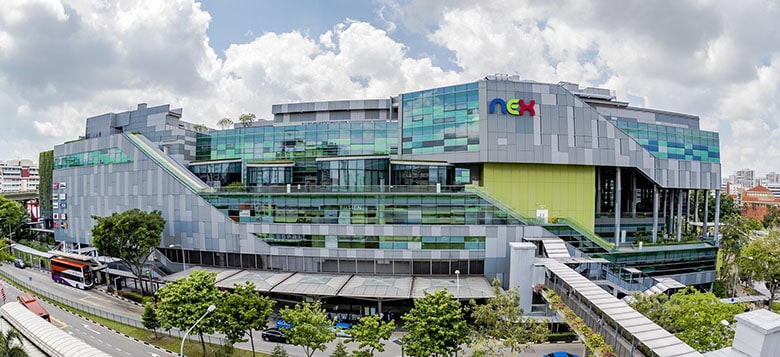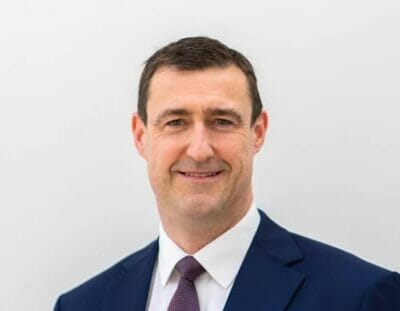
A PGIM, CIC and NTUC joint venture has just completed an upgrade of Singapore’s Nex mall
Two separate deals announced on Tuesday highlight the rising popularity of green loans in Singapore’s property market as developers and asset owners leverage financing opportunities to create more efficient facilities.
Gold Ridge, the owner and developer of NEX shopping mall, said it secured a S$900 million ($669.3 million) green loan for refinancing the retail destination in northeastern Singapore. Warehouse specialist Logos, meanwhile, obtained a S$48 million green loan for its Food21 production and logistics facility on the western end of the island.
Both projects received preferential terms as a result of eco-friendly enhancements that earned Green Mark certification by the city-state’s Building and Construction Authority.
“The strategic improvements completed at NEX geared toward furthering the sustainability of the asset are demonstrative of PGIM Real Estate’s broader commitment to incorporating ESG principles across our global portfolio,” said Benett Theseira, head of Asia Pacific at PGIM Real Estate, the asset manager of NEX.
Doing Well by Doing Good
Three large local banks — DBS, OCBC and UOB — loaned the S$900 million for the NEX refinancing. The deal marks the first foray into sustainable financing for Gold Ridge, whose stakeholders include Mercatus Co-operative, a real estate firm backed by Singapore’s NTUC trade union federation; Chinese sovereign wealth fund CIC; and PIM Foreign Investments, which like PGIM is a subsidiary of US giant Prudential Financial.

PGIM Real Estate Asia head Benett Theseira
The green finance deal comes soon after NEX attained BCA Green Mark Gold Plus certification, an improvement on the mall’s previously held BCA Green Mark Gold rating. The upgrade followed enhancements to NEX’s recycling programme to include e-waste, a chiller plant room optimisation programme, the launch of a green procurement policy, the installation of a water management system to monitor water consumption, and a commitment to form a green committee with participation from tenants.
Located at 23 Serangoon Central, the seven-storey NEX is the biggest mall in the North-East Region of Singapore. The property is fully integrated with the Serangoon Bus Interchange and the Serangoon Interchange Station, where the North-East Line and the Circle Line intersect.
Sustaining a Garden City
After rolling out its first Green Building Master Plan in 2006, Singapore published a new version of the blueprint for a sustainable city last year, pushing forward with its goal of having 80 percent of the buildings in the island state go green by 2030.

Andrew Macpherson, Head of Asset Development, JLL
Last year introduced new minimum energy performance standards for new and existing buildings, requiring a 50 percent improvement over 2005 standards for new developments and a 40 percent higher efficiency for renovation work.
The scheme includes government subsidies for refitting existing buildings, and it also provides for the state to work with participating financial institutions to take on part of the risk of any potential loan default by a green project.
Beyond the government incentives, asset owners in Asia are seeing an increasingly compelling business case for more efficient buildings, according to Andrew Macpherson, head of asset development for Asia Pacific at JLL.
“Buildings with high sustainability credentials can attract rental premiums of between 5 and 10 percent,” Macpherson said.
“Also, for new green buildings, rental velocity is significantly higher as occupiers are placing increasing value on sustainability,” he said, noting that with a capital cost premium of about 5 percent to refit a building to meet sustainability standards, more investors are seeing financial benefits from incorporating green approaches into their projects.
Fresh Financing for Food Shed
For Sydney-based Logos, the three-year, S$48 million green financing package for its Food21 facility is the company’s second green loan in Southeast Asia.
The loan’s conditions include Singapore’s first green interest rate swap, under which the preferential rate paid by Logos is stepped up if the project fails to sustain its green credentials.
Food21 is a five-storey, 28,800 square metre (310,000 square foot) food production and logistics facility in the Tuas West area. Upon completion in December, the property was awarded a BCA Green Mark Platinum certification for having incorporated thermal insulation, certified low-carbon-emission materials with a high recycled content, energy-saving lighting, and native drought-tolerant landscaping into the design and construction.
In addition to the Food21 package, Logos in December secured $120 million in debt financing from International Finance Corporation to support development of two sustainable logistics estates in the Greater Jakarta area.
The Indonesian deal provided the green loans for construction of Logos Cikarang Logistics Park and Logos KLOG Cibitung Logistics Hubare, both of which are targeting certification under Singapore’s Green Mark code and are designed to comply with IFC’s green-building standards.
Leave a Reply